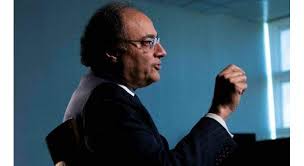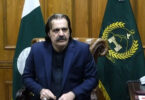F.P. Report
ISLAMABAD: Federal Minister for Finance and Revenue, Muhammad Aurangzeb on Saturday briefed the chiefs of international financial institutions about the country’s economic reform initiatives and development priorities by the government of Pakistan.
The finance minister met with World Bank’s Regional Vice President for South Asia, Martin Raiser to discuss Pakistan’s reform initiatives and development priorities in Washington DC. During the meeting, the finance minister expressed satisfaction that the new Country Partnership Framework (CPF) between Pakistan and the World Bank would be finalized soon. He underlined the government’s reform thrust in the areas of energy, taxation and state-owned enterprises (SOEs), highlighting the pursuit of both short and long-term goals in these crucial sectors.
Referring to his earlier meetings with the senior leadership of the World Bank, the finance minister stated that the Bank’s focus on climate change, digitalization, and human capital development aligns well with the priorities of the government.
The finance minister highlighted the government’s vision to realize Pakistan’s true economic potential in terms of sustainable economic growth. He stressed the importance of timely completion of development projects and the realization of intended impacts and outcomes, emphasizing the need for effective implementation and monitoring.
He also briefed Mr. Raiser on the role of the Special Investment Facilitation Council (SIFC) as a one-window facility for investment promotion and facilitation. Both sides agreed on the need for reforms in the agriculture sector, water management, and waste-water treatment. The finance minister also met with Brent Neiman, Deputy Under Secretary for International Finance at the U.S. Department of Treasury, on the sidelines of the IMF/World Bank Spring Meetings in Washington D.C. Finance Minister briefed Mr. Neiman on Pakistan’s positive economic indicators in the wake of the Stand-By Arrangement (SBA) signed with the International Monetary Fund (IMF).
He informed that the government has prioritized reforms in taxation, energy sector, and state-owned enterprises (SOEs). He underscored the United States’ significance as Pakistan’s largest trading partner and a key source of remittances and Foreign Direct Investment (FDI). He briefed Mr. Neiman on the role of the Special Investment Facilitation Council (SIFC) in facilitating foreign investment into the country.
Finance Minister welcomed his visit to Pakistan after the presentation of the budget and assured full support in this regard. Muhammad Aurangzeb held a meeting with Jin Liqun, President of the Asia Infrastructure Investment Bank (AIIB) and discussed with him Pakistan’s economic trajectory and explore avenues for enhancing cooperation in infrastructure development.
During the meeting, the finance minister briefed the AIIB President on Pakistan’s positive economic indicators, including improving foreign exchange reserves, a stable currency, declining inflation rates, and a surging stock market. He highlighted the renewed institutional and foreign inflows into the market, on the back of the successful 9-month Stand-By Arrangement (SBA) with the International Monetary Fund (IMF).
The finance minister informed Mr. Jin Liqun that Pakistan was looking to enter into a larger and extended program with the IMF, building upon the progress achieved under the SBA. He identified broadening the tax base, fixing the energy sector, and undertaking state-owned enterprise (SOE) reforms as key priorities of the government. The minister expressed gratitude for AIIB’s support in the aftermath of the devastating 2022 floods, particularly the co-financing of US$ 250 million for the RISE-II program of the World Bank. He reaffirmed Pakistan’s commitment to continue working closely with AIIB on the infrastructure development of the country. (APP)







